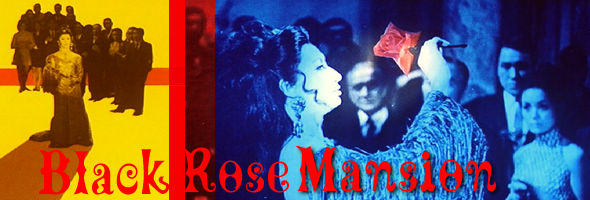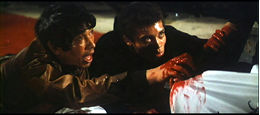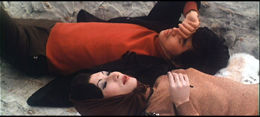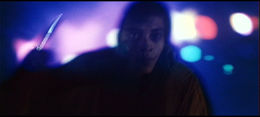
Color, 1969, 90m. / Directed by Kinji Fukasaku / Starring Akihiro Maruyama, Eitarô Ozawa / Chimera/Ventura (US R1 NTSC) / WS (2.35:1) (16:9)
Darker and much more gothic than its companion film, Black Rose Mansion centers entirely around Ryuko (Maruyama), a nightclub performer whose signature black rose pops up in every performance. Wealthy Kyohei (The H-Man's Eitarô Ozawa) arranges a gathering at his private mansion to celebrate his beloved star, but trouble begins when a strange variety of other men turn up and vie for Ryuko's affections. Among them are the millionaire's son, Wataru (Masakazu Tamura), and more than a few criminals; amidst hallucinatory flashbacks and fantasies, the mansion soon turns into a feeding ground of lust and murder.
Often relegated to the sidelines of the entertainment industry, female impersonators sometimes find that big break to catapult them into the spotlight. Divine and RuPaul spring to mind, of course, but other countries got there much earlier and cultivated this fascinating form of celebrity before most Americans even know what "drag" meant. Case in point: Akihiro Maruyama, the glamorous star of Black Lizard and Black Rose Mansion, a pair of campy cult items from the late Kinji Fukasaku.
 In these vehicles designed to exploit the star's unearthly charisma, Maruyama segues from femme fatale to comic foil with bewitching ease, making these curios even more beguiling today now that audiences have learned to swallow postmodern winking without any protest.
In these vehicles designed to exploit the star's unearthly charisma, Maruyama segues from femme fatale to comic foil with bewitching ease, making these curios even more beguiling today now that audiences have learned to swallow postmodern winking without any protest.
 The fractured structure of Black Rose Mansion extends from the plot itself to the editing of the film, rife with freeze frames, color tinting, distorted lens effects, and bizarre mood lighting. As usual Fukasaku manipulates the scope image extremely well; a genre-hopping chameleon best known for helming The Green Slime, Virus, the Japanese segments of Tora! Tora! Tora!, a slew of outrageaous yakuza films, and the incredible cult favorite Battle Royale, Fukasaku rarely bores his audience even when the story might not quite make sense. Such is the case here, as style overtakes any kind of rational behavior on the part of the characters. When two men wind up wriggling bloody on the floor and clutching at the white fabric of Ryuko's dress, it's just another soapy chapter in this strange time capsule from an era long gone.
The fractured structure of Black Rose Mansion extends from the plot itself to the editing of the film, rife with freeze frames, color tinting, distorted lens effects, and bizarre mood lighting. As usual Fukasaku manipulates the scope image extremely well; a genre-hopping chameleon best known for helming The Green Slime, Virus, the Japanese segments of Tora! Tora! Tora!, a slew of outrageaous yakuza films, and the incredible cult favorite Battle Royale, Fukasaku rarely bores his audience even when the story might not quite make sense. Such is the case here, as style overtakes any kind of rational behavior on the part of the characters. When two men wind up wriggling bloody on the floor and clutching at the white fabric of Ryuko's dress, it's just another soapy chapter in this strange time capsule from an era long gone.
 As with other entries in the Chimera/American Cinematheque/Vitagraph Japanese series, Black Rose Mansion has been treated to a splendid special edition. The anamorphic transfer looks quite colorful and rich, with dead on black levels (vital for this film in particular) and clear mono audio. The theatrical trailer is included, along with five other trailers from the collection, as well as a spotlight on the Egyptian Theater (home of the American Cinematheque) and a 20-minute video interview with Fukasaku, who sheds light on the production's history, recalls working with his gender-sliding star, explains the role (or lack thereof ) of writer Yukio Mishima in the two films, and recalls the Japanese studio system of the late 1960s. Perhaps better enjoyed by seasoned veterans of Japanese cult cinema than newcomers, Black Rose Mansion is an often confounding but eye-catching oddity rescued from oblivion; share it with someone you want to corrupt.
As with other entries in the Chimera/American Cinematheque/Vitagraph Japanese series, Black Rose Mansion has been treated to a splendid special edition. The anamorphic transfer looks quite colorful and rich, with dead on black levels (vital for this film in particular) and clear mono audio. The theatrical trailer is included, along with five other trailers from the collection, as well as a spotlight on the Egyptian Theater (home of the American Cinematheque) and a 20-minute video interview with Fukasaku, who sheds light on the production's history, recalls working with his gender-sliding star, explains the role (or lack thereof ) of writer Yukio Mishima in the two films, and recalls the Japanese studio system of the late 1960s. Perhaps better enjoyed by seasoned veterans of Japanese cult cinema than newcomers, Black Rose Mansion is an often confounding but eye-catching oddity rescued from oblivion; share it with someone you want to corrupt.
